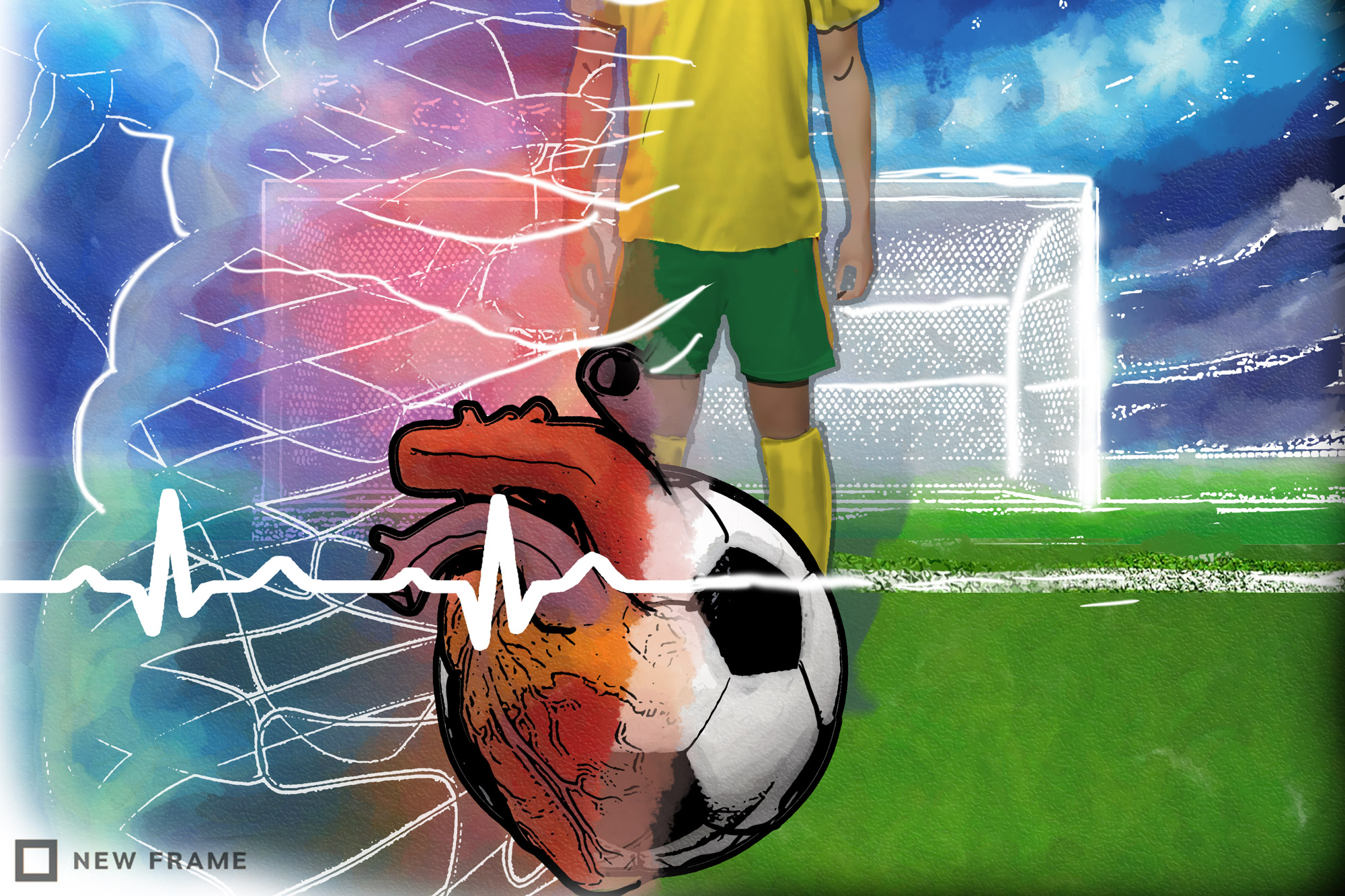Tackling football’s heart problem
There’s a growing list of footballers who have died on the pitch, either during a game or at training, because of cardiac arrest. Why is this the case and what can be done to prevent it?
Author:
28 September 2019

A triumphant Papy Faty spoke with glee about how he had beaten the system. Two months later, he was dead after collapsing on the football pitch.
His death could have been avoided had the Burundian midfielder not defied doctors’ orders, twice, by signing professional contracts with first division side Real Kings in Durban and eSwatini’s Malanti Chiefs after being told while at Bidvest Wits to quit playing football because of his heart condition.
“I decided not to go to the operation because it wasn’t a good idea,” Faty told Kick Off magazine. “I’m using a normal muti, African muti. That’s why I have [played] three games [and] nothing happened.”
Two months after he said this, tragedy struck. Faty’s fragile heart gave in and he died during Chiefs’ match against Green Eagles at Killarney Stadium in Pigg’s Peak, eSwatini.
The signs were there. He collapsed during the Kings’ match against University of Pretoria in September 2018. He spent just six months, featuring in only three games, in Durban in his first act of defiance against the doctors who had picked up his heart condition.
Related article:
“I am sorry to say this, and may his soul rest in peace, but it was irresponsibility from his part because he was told that he can’t play and it wasn’t only one doctor who told him that,” said Bafana Bafana team doctor Thulani Ngwenya.
“It was two doctors who told him to quit football, firstly a sports physician and then a cardiologist. I know those people personally. The South African teams wouldn’t accept him because they knew that it was a risk, but he decided to go to Swaziland and I don’t think that they did a thorough pre-competition and pre-season medical assessment in Swaziland.
“That is why I say that in Africa we are lacking behind in sports science. They didn’t do an echocardiogram [a thorough assessment of the functioning of the heart, which can determine the presence of many types of heart disease] or an ECG [electrocardiogram, which checks signs of heart disease], because if they did they were going to pick up these things and they were going to save someone,” said Ngwenya.
Africa’s heart dilemma
Faty’s case brought into sharp focus the different challenges the continent faces in the fight against heart problems, with African players more susceptible to cardiac arrest. If a player with a well-documented heart condition can get a professional contract, how thorough is the assessment to check the players whose heart problems aren’t known?
The biggest issue with cardiac arrest is detection. Many players go for years without being properly diagnosed because their issues aren’t picked up under the microscope of even the best medical help.
Nigerian footballer Nwankwo Kanu’s heart problems were only detected after the Olympics. He was receiving some of the best medical treatment at Ajax Amsterdam, who also didn’t pick up the problem that Inter Milan’s medical team found.
Related article:
Affordability is another issue. An echocardiogram costs between R5 000 and R8 000, and an ECG will set you back somewhere from R1 000 to R1 500.
Then there is the issue of belief. Faty genuinely believed muti would cure him, going as far as to say that there was nothing wrong with him but that he was bewitched because some doctors said there was nothing wrong with him.
“For some time, we as Africans have been lacking behind in terms of sports medicine,” Ngwenya said. “That is why right now we have something that we call a pre-competition medical assessment, where we do thorough assessments. We will do blood, musculoskeletal exam [a physical assessment] and then we will do heart examinations.
“In terms of the heart, we will start by examining it physically by using a stethoscope. After that, we will do an electrocardiogram that will check the conduction of your heart. And from there, we will go over and above to do an echocardiogram that checks the heart muscle itself, its activity, how big it is, heart valves and will detect any abnormality of a heart, heart muscle or a valve. When we have detected a problem with the heart, it will help us manage it.”
Ngwenya continued: “Most of the time, [sports] people who die because of sudden cardiac arrest are Africans, mostly West Africans. Africans’ hearts are designed in a way that they are bigger than normal, so when we play sports or do something that will make us exert ourselves so much that our heart muscles work harder, the heart becomes bigger. By working harder, you are enlarging your heart muscles because it means when the demand increases, the power of your muscles increases. It’s just like lifting weights. When you lift weights, your muscles bulk up.”
Fixing the problem
To change the status quo, Ngwenya has challenged club owners to change their ways. “It is important to understand the scientific aspect of the game because without a good, well-conditioned body, the coach has nothing,” he said. “The body cannot properly execute the coach’s tactics if it isn’t conditioned. We always forget that aspect as bosses.
“In South Africa, we have had three incidents affecting younger players, about 14 to 15 years old. They died because of sudden cardiac arrest. When they did the post-mortem, it was found that their hearts had a congenital abnormality from birth. They had an iron channel problem. Iron channels are some channels in the heart that help with the conductivity of the heart. If you’ve got a blockage of those channels, then your heart’s electrical activity cannot function properly.”
Mamelodi Sundowns, as a result of being bankrolled by billionaire Patrice Motsepe, are able to institute measures that would bankrupt clubs that aren’t as strong financially.
“One of the things we have changed is the protocol,” said Sundowns general manager Yogesh Singh. “When we get a player from outside the country, whether he is coming for trials for a day or a week, one of the first things that we do before he steps on to the field, we do a medical on him. In light of everything that has happened, we have implemented new medical protocols. You can’t take the risk, not only for the club’s sake but also the player’s sake.
“This puts a strain on your budget, but we as Sundowns and some other teams can afford it. But put yourself in the shoes of most of the smaller clubs. During the transfer window, you have many agents and clubs touting players, saying, ‘Have a look at this player.’
“You want to look at the player, but having a look at them means putting a player on the field. But now you have to take some responsibility for these players by ensuring that they go on these tests before they step on to the field,” said Singh.
The right direction
Premier Soccer League (PSL) chair Irvin Khoza has revealed that the organisation is working on changing how it does things. It wants to put measures in place to ensure that professional football in the country doesn’t add to the long list of players who have lost their lives owing to cardiac arrest on the pitch.
“There’s a deficiency in our medical form,” Khoza admitted. “Every season we ask the clubs to take players for medical assessment, but the forms don’t go far in making sure that there is a thorough diagnosis of the condition of the player.
“We do the casual check-up, heart rates and checking of the limbs. We should also include an MRI scan. We don’t check the vital organs that are important for the wellbeing of the player.
“We have arranged a workshop at clubs where we have to maybe revisit the medical form that we submit at the beginning of the season, that we must extend it to capture more information that will help us detect these conditions long in advance. It’s very important to have something exhaustive, because this is a big industry and the players are very important for the wellbeing of the PSL and the health of the game,” he said.
Khoza, who is also a club owner, disputes the criticism that some bosses put money before players.
“It’s not that the clubs are cutting corners, it’s because the medical form doesn’t require the clubs to go the extra mile to get the information that’s required,” he said.
“It is very important that we deal with the issues to make sure that we make it compulsory what information clubs can give to the league to make sure that we are satisfied that the player plays football. You can’t also be a risk in terms of the insurance cover, which could lead to a point where the insurance cover doesn’t pay because of the failure to disclose relevant information.”


